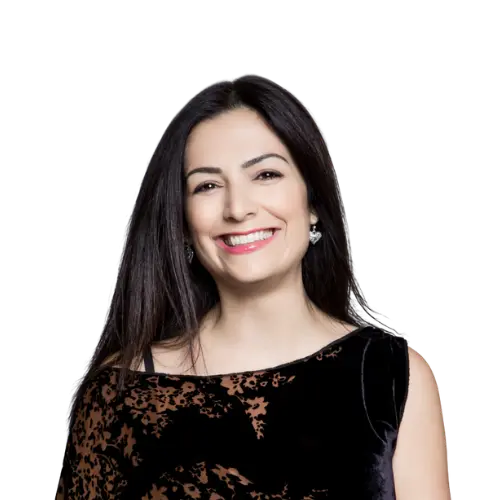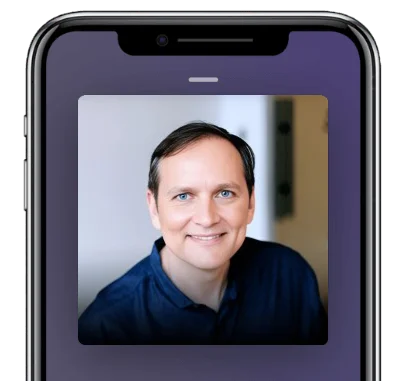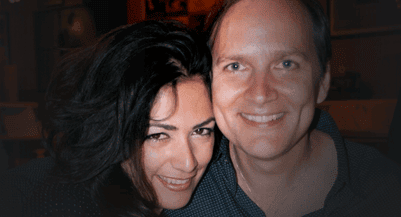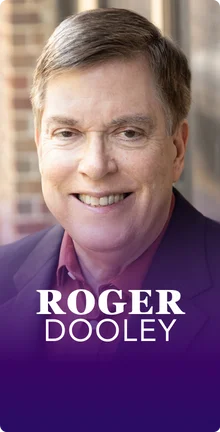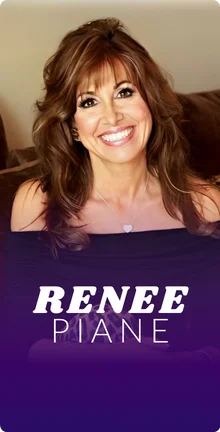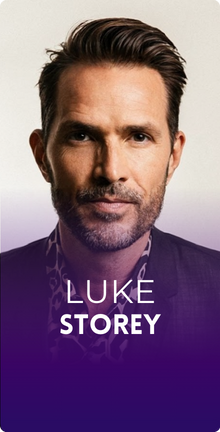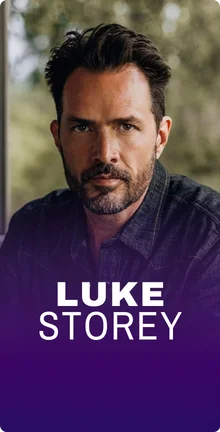In this Episode
- [02:15]Looking back to the first episode, what was Stephan thinking in creating this podcast?
- [04:35]Stephan reveals what his purpose on earth is, which is ultimately to touch millions of lives. He also discusses what his ideal legacy would look like.
- [05:33]One of the biggest changes that has happened in Stephan’s life since starting this show is his study of Kabbalah.
- [07:07]Orion has seen Stephan grow and evolve over the four and a half years they’ve been together, she explains. Stephan then talks about some episodes that have influenced him in terms of spirituality or self-development.
- [08:56]Stephan takes a moment to plug Orion’s podcast, Stellar Life.
- [09:51]How does Stephan think that sexuality and spirituality tie together? After he answers, he and Orion discuss sexual blueprints.
- [12:33]Stephan brings up Gary Chapman’s concept of five love languages, and he and Orion describe how these languages function within their relationship.
- [15:13]We hear about some ideas that Stephan got about relationships from past guests on Get Yourself Optimized, and how he’s implementing these.
- [18:50]Orion talks about a simple method of appreciation that can improve any relationship, because focusing on the good brings more positivity.
- [20:10]Is there anything else about relationships that Stephan learned from his show and wants to share with the audience?
- [23:20]Stephan explains that he has recently started going back to the gym and has hired a personal trainer, partly due to the impact of some of his guests.
- [25:47]What is biohacking? Stephan and Orion talk about the definition, then discuss Dave Asprey.
- [27:44]Stephan and Orion talk about stem cells, what they are, and why we should bank them for potential future use.
- [31:11]We move onto the topic of brain hacking, starting out with mindset and morning rituals.
- [35:30]Stephan talks about how he manages his time, and he and Orion then discuss recommendations for how to use time powerfully and effectively.
- [40:03]Having just explained why most of us shouldn’t feel pressured to accomplish as much in a day as a celebrity, Orion asks Stephan about delegating.
- [43:00]What does Stephan think are the most powerful traits of the most successful people in the world?
- [45:22]Stephan offers tips on how to recognize that someone is lying.
- [48:12]Orion digs deeper into a story that Stephan has just been sharing about how he overcame two of his major fears.
- [51:13]Stephan and Orion are seminar junkies, Orion points out, and explains that this is why they know so much about these various topics.
- [53:46]What are Stephan’s three top tips for optimizing your inner geek? 1. Establish new habits that will set you up for success. 2. Question your thoughts, because a lot of time they aren’t true. 3. Knowledge is power, so always be learning and optimizing and upleveling in every aspect of your life.
Welcome to Get Yourself Optimized – a podcast full of secret knowledge that will enable you to reboot your life. Ready to improve your health, wealth, partner intimacy, peer group, spirit, career, business and more? Then buckle up. Here’s your host, Stephan Spencer – author, speaker, SEO expert, and a quintessential geek who has been through his own incredible transformation. You wouldn’t even recognize him five years ago.
Hello and welcome to Get Yourself Optimized. I am your host Orion Talmay. No, you are not making a mistake. This is Stephan Spencer’s show, but today we have a very interesting episode because this is episode number…
100.
100. My guest today is a three-time author. He is a genius. He’s an SEO expert. He is amazing, and he is the love of my life.
That’s so sweet.
Mr. Stephan Spencer. Today you’re gonna hear him speak. You’re gonna hear him share his amazing wisdom. That’s why I married you, baby. Not only because of your good looks, because you’re so, so smart.
Thank you.
Oh yeah, sorry we’re recording. We just had a moment here. I’m gonna interview Stephan, and Stephan is gonna share with you guys all the lessons and some of his favorite tips and tricks and tools and insights and, like Oprah Winfrey always say, “aha moments” or “lightbulb moments” from Get Yourself Optimized. It’s been a long road, baby.
Yes, it has – a lot of episodes. Almost two years.
Two years. Two freaking years. Looking back, thinking about your first episode, what were you thinking in creating your podcast?
My initial goal was to create, what Kevin Kelly calls, a thousand true fans. If you have rabid fans who are just so excited about everything that you produce – you’ve changed their lives, you’ve made a difference for them, then let’s say that you release a book. That’s where I got the idea for Get Yourself Optimized. The beginning was to write a book about the topic of personal transformation. If I had those thousand true fans clamoring for my next big project, and that project happened to be a book then that would make me very interesting to a publisher. I am actually looking for a publisher for Get Yourself Optimized book, so that’s how the podcast started.
Right. If you have been listening to Stephan’s show for a while now and you are one of those true fans, then show Stephan some love because he works so hard on this show. It takes hours and hours, and you’ve probably put thousands of hours into the show, finding the guests. There’s so much that goes behind the scenes, so if you can show Stephan some love, just comment on the podcast and review the podcast and send him an email. Just say, “Wow, thank you for having this amazing show because I got so inspired and empowered.” He is a very heart-driven leader, and he just wanna help and touch the hearts of people.
Thank you so much for saying all that. That’s really beautiful. Thank you. It really is a labor of love that I do this podcast.
Yeah, I know, and since I know him intimately, I know that – like you said, it’s a product of your heart. Everywhere he goes when he meets people, he change their lives. He will have a conversation with anyone, and sometimes he gives, I think, a little too much of his time to just help strangers in so many ways. I think having the podcast is you fulfilling a little bit of your purpose on earth. What is your purpose?

I want to make a difference for people. I want to reveal light. I want to leave a legacy – a lasting legacy and touch millions of people’s lives. That’s my ultimate goal – touch millions of lives.
If I can wave a magic wand and you can have your legacy, what will it look like?
I have a foundation, a non-profit, that is making a difference for a lot of people. I’d like to have a best-selling book that is in many, many people’s hands. I have interviewed some amazing best-selling authors, who’ve touched millions of lives, made a difference, saved countless lives like Byron Katie. I want a legacy like that, like Katie. She’s incredible. What a gift it was to have her on my show.
Yeah, she’s amazing. What do you think is the biggest change that happened in your life since starting the show?
Whatever I do in the world, if it reveals light, I know I am on the path.
So many changes. One of the biggest is my study of Kabbalah, and it’s almost like an ancient self-help movement. That was actually one of the most recent episodes – was with our Kabbalah teacher, Yehuda Ashkenazi. That’s episode number 98. It’s just whatever I do in the world, if it reveals light, I know I am on the path. That includes me teaching from stage or through online courses, in my consulting, and just how I show up in the world. The things that you do for others, where you know nobody else is watching. If there’s somebody that you need nothing from and yet you treat them with respect and love, that’s the true test. Because so many people are doing stuff – Kabbalah refers to as reactive sharing, where you’re giving in order to get. You are not doing it just to get the light from the creator, you are doing it because you figured that you’re gonna look good, or you’re gonna get a thank you in return. Do you give money to a homeless person and expect nothing from them? What if they yell at you when you give them money? That’s gotta be okay, otherwise, it’s reactive. It’s not coming from a place of selfless giving. It’s just from a place of give and take, of tit-for-tat.
How long have we been together?
How long have we been together?
Yeah.
Four-and-a-half years.
Yeah. I’ve seen you really grow and evolve in the last four-and-a-half years. Really evolving and changing, also growing as a spiritual being. What are some episodes that you were influenced by that talked about spirituality or self-development?
There had been a lot of them.
It’s pretty much intertwined. There is a thread in each and every one of the episodes because whether it is business or sexuality, everything has an element of self-development in it.
Yes, let’s start with some of the spiritual episodes specifically spiritual. There’s Yehuda Ashkenazi and Kabbalah. There is one with Karen Hoyos on intentionality and purpose. That was really powerful.
What was powerful about it?
If you understand that your ego is separate from you…
What is an ego?
Ego is a construct. It’s an idea of how you see yourself. It’s not who you truly are.
An ego is a construct. It’s an idea of how you see yourself. It’s not who you truly are.
An identity?
Yeah, it’s an identity, but it’s not your true self. Your true self, your essence, as Karen refers to it, is how you are if you peel those layers away and you’re just real. Real, raw, vulnerable – the true you.
The word “essence” always reminds me of Karen Hoyos.
Yes.
The essence.
I love the way she says it.
She’s got this amazing accent – Latina. “Essence.” I don’t know how she says it.
That’s a great episode, and she’s had an impact, I know, for both of us. She was on your show too, on Stellar Life, and I need to plug your podcast right now.
Well, go ahead.
It’s amazing. She’s had some of the same guests as me, and she’s had a whole bunch of other ones that I have not had. Her interview style is very different, as you can tell. It’s an incredible show. You can subscribe via iTunes.
Stellarlifepodcast.com.
Yes. That’s the easiest way. Just go there and hit the subscribe button on your chosen platform. You’ve had Karen on your show, on Stellar Life, and that was a great episode. We also – you mentioned in passing “sexuality,” and we both had Jaiya, the sexologist on each of our shows.
Jaya was your very first show. How do you think sexuality and spirituality tie in together?
If you have a powerful sexual connection with your lover, with your significant other, I think that increases the depth of the relationship. Also let’s say that you are wanting to get pregnant or whatever, if you show up with more intentionality, if you have this powerful intention of creating this human being, bringing the soul into the world – not just, “Oh, let’s get it on,” then I think you’re gonna end up with a much better outcome. You’re a better creator.
What’s your definition of spirituality?
Spirituality is getting to the true you and being connected to the fabric of creation and to everybody else. We are all connected.
I think it’s just getting to the true you and being connected to the fabric of creation and to everybody else. We are all connected.
This is the idea of Oneness – the idea that we are all connected. There’s the illusion – Maya – the illusion of separation; that’s why people sometimes feel alone and unfulfilled because they feel separate from each other. But when you connect to the infinite source and you understand that we’re all one and really get from your heart the idea of oneness, not in your brain – in your heart. You gotta experience it.
Yes, the oneness monks in India say that the divine or the creator is an experience, not a belief.
Right, and so it connects to spirituality in a way that if you and your partner are one, and you see him or her as a part of you, then the sexual act can be a very spiritual act. It does not matter. Jaya spoke about sexual blueprints. There is the sexual, the sensual, the energetic, and the kink.
And shapeshifter, which is a mix of all the other four.
Right. Whatever your own sexual blueprint is, you can still create a very spiritual connection through kink or through energetic. Energetic is just a very obvious one, which is more of the tantric type of sex. But it does not matter what your sexual blueprint is or what is your deep darkest desire, you can still create a spiritual connection through the understanding of how much similar you are with your partner and the idea of oneness.
Yeah. Another thing too I think is a good analogy for sexual blueprints is Gary Chapman’s Five Love Languages, because if you understand your partner’s primary love language…
What are they?
Acts of service, physical touch, words of affirmation, gifts, and quality time.
I think I’m a love language shapeshifter, because I like them all.
I think you especially like gifts.
I like gifts a lot, but I like everything else too.
Yeah, if you have a primary and your partner has a primary or maybe multiple secondaries, understanding each of your own primary love languages allows you to be more intentional with how you show your love.
Give me an example.
Let’s say that gifts as your primary love language, I prefer physical touch as my primary.
All day long, everyday, all day, 24-7, 365 days.
Anyway, if all I do is love all over you all the time and I don’t bring you flowers or handmade cards or little souvenirs or whatever, then you don’t feel loved or connected in a way that you most value.
If I use my love language and I’ll just shower you with gifts all day long, and you just like physical touch, and you’ll be, “O my god, I don’t feel the love. There’s no love here for me.”
Exactly. If you think about the sexual blueprints, it’s very similar. If you know that your partner’s primary sexual blueprint is energetic and you go straight for the goal there, then you’re missing the journey and you’re not showing the kind of sexual attention that your partner most craves and appreciates.
Let’s talk about relationships. You had amazing, amazing guests that talked to you about relationships, from John Gray to Alison Armstrong to…
Yes. Imago therapy – so many. What are some of the most interesting ideas that you got from them? And what are some ideas that you are implementing in your own life?
Okay, great. Alison Armstrong – she’s amazing. I’ve had the pleasure and the honor of being in workshops that she taught on understanding women, and what an insight it was to understand for example that there are two ways that you can injure a woman.
What are they?
Both of us – both you and your partner have a feminine and a masculine.
On the masculine or on the feminine. Both of us – both you and your partner have a feminine and a masculine. When I injure your feminine, you might want to crawl up into a ball, but if I injure your masculine, you come right at me. I’m very clear…
And beware.
That’s right. I’m very clear which side of you I’ve injured, if I said something hurtful. The way that I respond is gonna be different.
How do you respond if you hurt my feminine?
First of all, there’s this thing that happens for women when they crawl into a ball and they ask for example, “Don’t touch me,” you need to respect that. “Don’t touch me,” but also if they say something hurtful and say, “Just leave me alone. Go away,” that does not mean “go away.” That means I’m testing you, and if you go away, I will feel abandoned, but if that’s coming from the masculine, that’s a different thing. I need to understand whether it’s coming from the masculine or the feminine, and then if, let’s say, it’s coming from the masculine instead and you say something back in return – if I escalate or become defensive or minimize or what have you, then your masculine will come push even further, which is just gonna escalate. If you understand these different response mechanisms and defense mechanisms that we have, both on our feminine and our masculine side, then you can diffuse the argument instead of throw gasoline on the flames.
There’s something that I love that you are implementing in our relationship. I don’t know how long we’ve been doing it, but that’s the practice of gratitude that you studied from Harville Hendrix.
The creator of Imago Couple’s Therapy. What an amazing, amazing guy. He is the author of Getting the Love You Want, which is a huge New York Time’s bestselling book. He’s been on Oprah. He’s an amazing gift to humanity. Imago therapy includes this practice called the daily appreciation. Ever since we had him on the show – him and his amazing wife, Helen LaKelly Hunt – I just wanted to implement this. I think we’ve only missed maybe 20 days out of the last 2 years?
Yes, we do it pretty frequently.
Yes. It’s pretty much every single night.
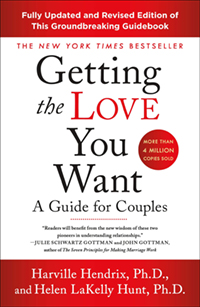
What I love that you do is that when I travel, you call me to appreciate me, or if you can’t reach me, then he’ll make sure to leave a voice mail of appreciation. That just makes me feel so special.
I was so touched and moved when Harville said on the show that he hadn’t missed a single day with his wife of doing these appreciations for 18 years.
This is how you do it. It is so simple, and it can improve any relationship that you have in your life because when you focus on the good, you get more of that goodness. Every night before you go to bed, you say a minimum of three things that you appreciate about the other person. It can be very simple like, “Thank you for doing the dishes. Thank you for smiling at me, and thank you for encouraging me.”
“I appreciate your beautiful smile. I appreciate you doing the dishes earlier today. I appreciate how you hold my hand, when we’re walking down the street.”
It’s so profound. I love it.
What a great way to end the day, instead of, “Oh, can you remind me in the morning to run this errand?” or “Can you do this favor for me tomorrow?” or “You know that thing that you said earlier, that kinda hurt my feelings.” Instead of ending in negativity or in requests, end it with gratitude, appreciation, and abundance. You’ll get more out of life.
Is there anything around relationship that you want to share with your audience that you learned from some of the experts on Get Yourself Optimized?
John Gray – author of Men are from Mars, Women are from Venus. He talks about the importance of hormones and in particular testosterone. Actually, I had another guest talking pretty much solely about testosterone; that was Chris Gatchis. Both of those episodes are amazing. One thing that I did years ago, early on in our relationship, is I started taking testosterone-boosting herbal supplements. It definitely had an impact. I’m more vital. I feel stronger. I feel I’m just more masculine, more present, more powerful, more capable. I had my testosterone tested recently. It’s at 720, which is quite good for my age.
It’s excellent.
I’m pretty much ready to go whenever. We can hit pause on this episode.
Too much information. Anyways, testosterone.
It’s very important.
It’s also important for women, not only for men. We all need to have our hormones in check. Because if you have low hormones, you can get brain fog, you can get depressed, you can lose your libido. There are so many ways that you can increase your libido and your desire and your feeling-good hormones anyways, by supplementing with herbal supplements. If you want to increase your hormones, use bioidentical hormones. In the past, bodybuilders used to use synthetic hormones, and because they’re synthetic, they have tons of side effects. They’re so not good for you, but bioidentical hormones mimic the hormones in your body. If you’re feeling like there is something missing – you don’t feel as alive as you used to, then go and please do yourself a favor and check your hormones. If you need, just supplement with testosterone-boosting supplements. Which episode is that? Do you remember?
The episode with Chris Gatchis. That was a very early one. I think that was episode…
Was it 29?
Episode number 10.
Number 10 on October 29th.
2015.
Wow! Long, long time ago.
Yes. That was a great episode, and you have a great episode on female hormones, and that was with Anita Chaperon. What episode number was that?
I remember, but let’s move on and we’ll circle back to Anita’s episode, if you want to learn more about hormones for women. You also had a lot about fitness. You had experts about fitness and body. What did you learn from them? I know that because you interviewed fitness experts, but lately, you’ve been going to the gym, you’ve been working out, you’ve been really owning your body. What did you learn from those fitness experts?
I am already starting to see some results. You’re starting to see some results.
I recently started going back to the gym. I hired a personal trainer. I am already starting to see some results. You’re starting to see some results.
Yeah, you look good, baby.
Thank you. I was really impacted by some of our guests. That included Michael Morelli and Mark Sisson, Mark’s Daily Apple. In fact, he was instrumental on a good friend of ours losing 20 pounds. Remember, we were talking about that over dinner. He went from just doing high intensity, all-out workouts to low intensity because he learned something from that episode, where I interviewed Mark.
Really? Wow. It’s so fun because you don’t even know the impact you have on people’s lives that are listening to the episodes, so yes, again if you had a breakthrough just listening to one of Stephan’s episode, let him know. Email him. Let him know. He needs to know that. He’s not monetizing. This is just a monthly expense for us, so a nice way for you guys to reward him for the hard work that he does is just let him know, give him a testimonial, give him a five-star review. Let him know of some kind of a breakthrough that happened to you in your life because you listen to this show.
Thank you for that. That’s a great reminder that one of the ways that I ended up learning about this particular situation with Mark Sisson’s episode from my friend, Greg, was we were just chatting. He said he listened to that episode, and it made such a profound impact. He lost 20 pounds.
That’s amazing.
Oh, why don’t we shoot a little, quick video, and you can tell my listeners about it. That is what’s on the show notes page for episode number 63 with Mark Sisson. If you haven’t heard of Mark Sisson, he’s a big deal. Mark’s Daily Apple podcast is a huge, very, very popular podcast, and his blog has been around for ages.
He’s a great guy. Let’s talk about biohacks. What’s biohacking?
Biohacking. The idea here is you can hack your body just like you can hack your computers.
You hack your biology.
Yes, you hack your biology. You make a profound difference in your body performance, your brain performance, your longevity.
Yeah, we love Dave Asprey. We’ve been to his book launch party when he launched his – what was it – the Bulletproof Diet book.
The Bulletproof Diet. Yes. He has another book out.
We both had him on our podcast.
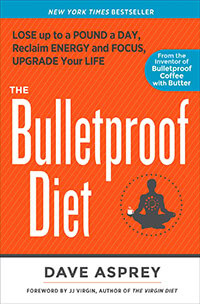
Yes, we had.
We saw him a few times. We really like him. He is so nice.
Yeah, his newest book is called Head Strong. That one is more about brain hacking. He’s kind of the…
Authority.
You’d even say he’s kind of the godfather of biohacking. He is the first person that most people think of when you hear the term biohacking, if you’ve heard that term before.
This man tried everything.
He’s had such crazy procedures done to him – the things he has done to himself.
Injecting stem cells to his brain and his privates.
That’s crazy stuff. His wife has done a lot of that sort of stuff, too. The O-Shot, which is getting stem cells injected into your…
Privates.
Yes, if you’re a woman. The P-Shot, if you’re a man. It can massively improve your performance.
Yeah, and like Dave said, “There is nothing wrong with my performance before that shot, but boy, after that…” He does not say that. He does not even sound like that. He’s Canadian.
Can you imagine getting a stem cell injection of your own stem cells into your privates? Yikes.
Why do we need stem cell injections? Why do we need to bank stem cells?
That’s another episode that is a must-listen. Dr. Harry Adelson. He is a stem cell doctor, and he explains it very well but I will do my best with this as a non…
Non-stem cell doctor.
Yes. Let’s say that you’re 70 years old. You need to have something done that’s a pretty major procedure. As you get older, your stem cells degrade. They’re not as prolific.
What are stem cells?
They are precursor cells to every cell type of your body.
It’s almost like the ace in your deck of card. It can be – not the joker. It’s like the joker; it can be any card. Stem cells can become a ligament or a bone or a vein – whatever it needs to become, or cartilage.
Any cell type, so it’s like a blank slate. As you age, the stem cells – they’re not as…
Potent. They are not as strong as they can be. When you’re younger, you wanna harvest those stem cells, and the way you do it is you harvest them from your adipose tissue, which is your fat. You harvest them from your bone marrow, and then what that doctor did is he’s mixing both of them and inject it to places where you had injuries or places that are needed. People do grow ligaments and cartilage. It’s pretty profound.
If you just Google “stem cell before and after,” you can see how people’s faces changed by getting stem cell injections into their face. These are their own stem cells.
You know, I went to a laser clinic nearby, and they wanted to give me a treatment with cow embryonic cells. They said it works wonders, but I just don’t wanna have another specie on my skin. It sounds a little weird.
The best time to plant a tree was 20 years ago. The second best time is today. Share on XThese are your own cells. Why not get them banked, so that in the future as you age, you can go back in time and use stem cells from, let’s say, 20 years ago. The best time to plant a tree was 20 years ago. The second best time is today.
Today.
The best time to harvest it and bank your stem cells was 20 years ago, but the second-best time is today.
If you or anybody you know is suffering from joint pain, or before you even think about going to this hip surgery or knee surgery, please consider stem cells. It is more expensive for sure.
It is not covered under insurance.
No, because then they won’t make the money that they make. It’s all a money game. If it is possible for you, then go and research stem cell therapy and see if this is for you.
The best place to start I think is episode number 82 with Dr. Harry Adelson. He is the stem cell doc that actually injected Dave Asprey with stem cells into his privates and into his brain – not directly into his brain, into his bloodstream, and lowered the blood-brain barrier with drugs so that it ended up in his brain. He’s had great results from the stem cell procedures.
Let’s talk about brain hacking. Let’s start with mindset. How do you condition your mind for success?
That’s a great question. I condition my mind first thing in the morning with a morning ritual. A couple of episodes I covered on morning rituals. One was with Hal Elrod. That was a great one. Then also with Raul Villacis. The morning ritual is a great way to get your mindset straight for the day and show up more powerfully, be more intentional. Ephraim Olschewski, the hundred thousand-dollar-a-year coach. That’s what he charges just to work with him an hour a week, paid upfront. If you listen to that episode with Ephraim, you’ll understand that being intentional is a key to success. If you in your morning rituals incorporate intentionality, it’s not just like going “Roar,” and getting your masculinity going, if you’re a man. But it’s about being intentional.
What’s your morning ritual like?
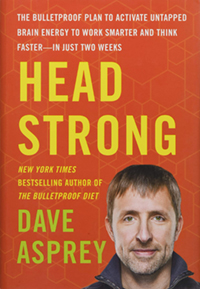
I have affirmations that I do. I have a morning connection that I do to my creator. Kaballah prayer called Ana b’Koach. I have mala beads. There are 108 of those. I got those from Amma, the hugging saint. You were with me. That was pretty special getting a hug from Amma.
I didn’t get to get a hug from Amma this time, when she was in L.A. because I was in Atlanta, but you did. You, lucky, lucky man.
You’ve gotten it twice.
I want another hug.
In New York, when I wasn’t there. We both gotten it twice now. It’s well worth the 5 or 10 hours of wait.
Yes, 10 hours or 12 sometimes. You wake up in the morning and you run your affirmations, you do your connections, you do your mala. I know that you also go and you lymphosize.
Yeah. I jump on a rebounder, which is a small trampoline, and move my lymph around because your lymphatic system doesn’t have a pump. It relies on gravity.
How do you get over with the temptation of looking at your phone first thing in the morning?
One thing I have done multiple times because I keep end up falling back into that pattern is…
Stephan is in love with his phone. If you separate Stephan from his computer or his phone, he’s gonna be miserable.
That’s not true.
It’s true.
I deleted the Facebook app from my phone. It’s been off my phone more than it’s been on. I have to reinstall it, when I do Facebook Live. I just have to remember to delete it again, after I do a Facebook Live. If I leave it on there, then I gravitate back into this distraction mode of checking my Facebook, and that is not a good habit. It definitely ruins your intentionality and your focus and your presence. In fact, in the episode I had with Cal Newport – he is the author of Deep Work. We talked all about distraction and this thing called attention residue. When you, just for a moment, check your phone, check your email, or whatever it is – take your attention from the task at hand, you’ve destroyed your productivity for at least 20-25 minutes. Attention residue is a real thing, backed up by science. Part of your brain is now occupied with that thing that you checked, whether it was, “Oh shoot. That text message. I’m going to have to deal with that. Okay, now back to this article I am writing.” Part of your brain is still occupied with that text message for the next 20-25 minutes, and it destroys your productivity.
So you condition your mind in the morning. You spend between 10-30 minutes on your morning ritual. You go into deep work, and how do you prioritize? How do you manage your time?
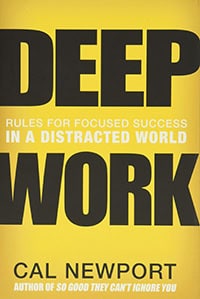
I use a methodology called GTD – getting things done. Yes, I had the author of Getting Things Done on my podcast, David Allen, who is one of the top gurus in the world on productivity. The GTD methodology has a lot to it. I’m not gonna go into it here because there’s too much, but just the fact that I can assign context to my next actions. Even just having the distinction of understanding that some things are Projects, because I haven’t broken them down enough, and some things I have broken down enough and they are Next Actions. Some things aren’t even necessarily things I should or need to do, so I distinguish those two. I call them Someday Maybes.
In our relationship, Stephan is more of the structured, organized person, and I’m more the free-flow, creative personality. One thing that Stephan introduced me to was the Things app. It’s called Things 3 app. This app so powerful. It allows you to really organize everything that you need with projects, and then assign it a date, and it links to your Google calendar. Check it out. That’s one of the most amazing, powerful tools that you can have to organize your business, to organize all those millions and millions to-do lists that you need to do.
A great tip that I heard – I forget from where, but if you think of your to-do list instead of as a get-to-do list, then it doesn’t feel so daunting and overwhelming. It feels kind of exciting, like you have lots of options.
I get it, but you know when it’s already [6:00] or 7:00pm, or 8:00pm or 9:00pm, it’s becoming a to-do list, not a getting-to-do list. I want to get to go and watch Netflix.
Things by Cultured Code is a great app. It’s both for the Mac and for the iPhone. They sync with each other. It’s GTD compatible, so you do all the stuff like Someday Maybes and Projects and Next Actions and Context, which I should explain is where you can assign either @ home or @ office, @ errand, @ phone, @ email. Then if you are, let’s say, out doing errands, you can just filter your next actions by context and only look at the things that are errands and not everything else and get overwhelmed. If you’re sitting in the doctor’s office, in the waiting room, and you can make phone calls, but you can’t do stuff that requires you to be at home or at the office, you can just filter by the context of @ phone, then you’re not getting overwhelmed with everything other than the phone calls that you could make.
I saw on Facebook this thing that showed Beyonce that said, “You have the same 24 hours that Beyonce has.” I’m like, “No, you do not,” because you know what’s the difference between you and Beyonce? I get the idea of – if Beyonce can do it, then you can do it. Woohoo. But it also creates a lot of pressure and stress for people because you do not have the 24 hours that Beyonce have because Beyonce has an army of PR people, instructors, coaches, helpers, VAs, and on and on and on and on that help her. Her 24 hours is 240 hours because there are so many people that are doing things for her. It’s almost like she’s an owner of a company. You can’t compare yourself to Apple because there are so many people in Apple that are working and doing things. You have to know that even though it’s easier to or you think that you can control everything and do everything. Eventually, when you really expand and grow, you need to delegate, and you need to have people helping you and just lose the pressure. You don’t have the same 24 hours of some of the big names out there because you probably don’t have as much help as they do. Let’s talk about delegating. I know you have many podcast episodes about delegating.
Yes, I did. One of my favorites is with Tim Ferriss.
He is also a biohacker and very, very famous. He is the author of the Four-Hour Workweek.
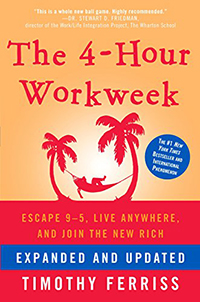
, Four-Hour Body, Four-Hour Chef, Four-Hour everything.
He does everything in four hours.
Apparently.
Increments.
In this episode with Tim Ferriss, we talked about outsourcing and delegating – getting a virtual assistant or an army of virtual assistants. I actually interviewed one of my virtual assistants, one of my rockstar VAs, Carolyn Ketchum, on another episode, and we break down my process for delegating and what my VAs do. I don’t manage my own inbox. My email is managed by my VAs. They are figuring out whether it goes into my Action folder or my Read/Review folder, if it goes into Archives, if it goes into the Waiting folder. I don’t have to deal with any of that stuff. I don’t have to operate out of my inbox. I get to maintain inbox 0, and I just go into my Action folder, check what I need to do in there and my Read/Review folder to see the FYI stuff that’s in there. It’s so freeing. Because how many hours a week do you spend in your email? It’s just a productivity suck. Imagine if you had somebody that was doing that for you. Yes, you have to trust them implicitly. They earn that over time. You make the right hire, and you give them the opportunity to earn that trust. I have VAs who have my credit cards even, my bank logins. Like I said, it’s a process, where they have to earn that trust over time. It’s freeing though when you do it. A couple of other episodes, where we talk about delegating, Chris Rugh. He gave me some great distinctions about when I have a blog writer to help me with blog post writing, to have a blog editor – a manager of the blog writers. He walks through that process on that episode – how to find people on Upwork. James Schramko, another great episode on delegating. He’s got a small army of people that are in the Philippines doing VA work for him. It’s possible. Even if you’re just a regular employee somewhere working for the man, you can still have VAs that help get your time back because that’s our most precious commodity.
What do you think are the most powerful traits of the most successful people in the world?
I think it starts with intentionality and purpose – powerful purpose, having a desire that is insatiable to create and build amazing things that stand the test of time. Their time frame, their time horizon is much, much longer than the typical persons. They are thinking in terms of hundreds of years or thousands of years. Somebody like Elon Musk is thinking well into the future, past his own death, and that’s amazing. Purpose and intention are a big part of it. Listen to those episodes with Ephraim Olschewski, Brent Charleton. That was another great episode talking about purpose and intention. He does chair work.
What’s chair work?
Chairwork is where you…
Sit on a chair?
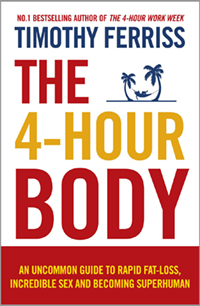
You sit in a chair. You get transported into another world essentially. You’re basically taking all that shame and guilt that were wiped on you by your caregivers when you were a child. You are giving it back to those caregivers, even if they’d passed away. That process is called “chair work.” Very powerful, very freeing. It’s like getting years of talk therapy condensed into one weekend.
Another forms of therapy that you spoke about in your other podcast episodes are NLP and hypnosis and even changing your handwriting can change your own character.
Yeah, that’s true. Mike Mandel, episode number 97. We talked about changing your handwriting to change your character traits, and he shared a story of somebody’s powerful transformation just by changing their handwriting. It seems crazy that that can have such a profound impact, but it does. We also talked about hypnosis on that episode, and NLP (Neuro-Linguistic Programming). You can use NLP to change your own limiting beliefs and patterns that don’t serve you. You can use it to influence others. You can use it to detect if people are lying even.
How do I detect if someone is lying?
You are looking for differences. You are looking for differences in their eye patterns and different behavioral patterns.
I always sense when somebody is lying. I’m almost like a human lie detector. I have a strong intuition.
I think you do as well.
What really annoys me is that when – I pretend like I don’t know that they’re lying, but then they really think that I didn’t notice.
You’re very intuitive, and you pick up on stuff. You don’t have to be with a special gift in order to detect if people are lying. You can just listen to that episode and look for these differences in their patterns and stuff. If they are slowing down – this even shows up in your writing. If somebody is lying, it shows up in their handwriting. You don’t even have to see the person or hear them speak. Really cool. NLP’s great for figuring out what’s gonna help you and breaking patterns that don’t work for you.
NLP is the language of influence, and through NLP and hypnotic technique, you can either break someone else’s pattern or influence them, or also you can influence yourself in healing past trauma. They don’t really go into the why you’re feeling what you’re feeling, which is the old, traditional way of psychology. This is more of the…
Psychoanalysis. Yeah.
Yeah, this is more of the new age psychology, I would call it, where it’s about forward-thinking and breaking the pattern. It doesn’t matter why you feel the way you feel; let’s just break this pattern and move on.
It works.
It works – yes and pretty quickly.
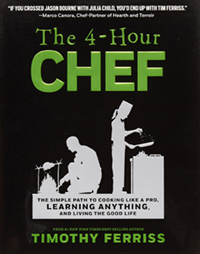
Yeah. Ken Dubner – he was a great guest talking about NLP and hypnotic techniques. Bart Baggett – another great episode. Fred Gallo, although that’s not NLP – it’s kinda related. It’s EFT, which is Emotional Freedom Technique.
Tapping.
Tapping. That episode was amazing. He’s the guy who made such a difference for me, when I was on a trip to Africa. As a person who would normally be terrified of heights and of water, I was able to kayak for the first time in waters that were infested by crocodiles and hippos, which are more dangerous than the crocodiles. That was in the Zambezi River, where Victoria Falls is. I was able to go to on a microlight, which is a hang glider with a motor attached.
Let’s go deeper into that story because it’s very interesting to me. So you’re on this trip with Fred Gallo, and you guys are going to cross the Zambezi River on a kayak, was it?
We were in kayaks going down the Zambezi River towards the falls.
Do you have a fear of water?
Yeah. It was the first time I’ve ever been…
Severe fear of water?
Yes. I never learned how to swim.
From past life, I think.
I don’t know about that, but certainly, it was developed over my lifetime from not ever knowing how to swim. I had this traumatic experience, where I was 20 years old and I was in the water in the ocean. I had a life vest on, but I turned blue. I was so cold. I was so freaked out. I turned blue. They got me out of the water, and I was shivering. I was freaked out. It was like I was in shock.
You were traumatized for life?
I don’t know about that because this guy, who’s an expert on tapping…
Traumatized until you met Fred Gallo, who has untangled this trauma through tapping on meridian…
Acupressure points. It scrambles the neural pathways – these ruts that are in your subconscious.
You rewire your brain, and it happens pretty quickly. How long did you work with Fred before you went in the water?
40 minutes.
Holy guacamole! 20 years in 40 minutes.
It stuck, too, because I was able to go on a jet ski for the first time, two years later. Three months later, I was inter-tubing for the first time in my life – going on an intertube being pulled by a speedboat on a lake. That was a little bit terrifying, but I was able to do it. I raised my hand and said, “Yes. I’m gonna go on this,” and I did it. The stuff sticks. It’s pretty amazing. The microlight – that was incredible to be in this hang glider thing that had a pilot piloting it. There’s no seat there basically; there’s this little tiny thing that’s kind of a seat. It’s in the open air. We’re above Victoria Falls, going into the mist, where it is all bumpy.
Nice. I wanna do that. Bucket list.
It was scary, but I managed. I said yes to it, and I was able to do it. I didn’t hyperventilate. Here I am able to tell the story about it. That’s all because of Fred Gallo. That’s a great episode. He is an incredible guy. You can even hire him to work with you on Skype to do the EFT and address, let’s say, fear of spiders or flying or heights or whatever it is.
Stephan and I are seminar junkies. We go and we study from the best of the best and the best in the world. That’s why we know about all these methods. That’s why we know about all these alternative healing modalities or ways to increase income or marketing. It’s just because we are around lot. How much of the year do you travel?
I don’t know. It’s probably at least a third to a half.
Probably half.
We’ve spent easily somewhere between half-a-million and a million dollars in personal development.
If not more.
Yeah, it’s been in the form of courses, masterminds, seminars, workshops.
You’re so lucky because we bring all these amazing guests. I, on my podcast Stellar Life, and Stephan here on Get Yourself Optimized and on his podcast Marketing Speak – bringing all these amazing, amazing guests for you to learn from. Keep listening to the episodes and expand your mind because this is how you grow and evolve. You never know what you’re gonna learn and how a little shift in knowledge can create a big shift in your own life.

Yeah. It could be in the form of your wealth-building. You could get some distinctions on how you’re investing in the stock market, and that could just set you up for life, like the Phil Town episode. He’s a big deal in investing.
We met him personally. We went to his farm in Orlando.
What a great guy.
Hugging his horses. He’s got amazing horses.
Yeah, he’s got – I think it’s over $10 million in the stock market at any given moment that he is playing with. You can learn from him. You can take his seminars that’s very affordable.
Keep listening to this podcast and learning from the best of the best in the world. The caliber of the guests in this show is very high, and just having Stephan with his genius mind – he’s a real genius sharing all these with you. You guys are lucky. Stephan, thank you so much for allowing me to interview you, and before we finish, what are your three top tips to optimizing your inner geek?
Okay. I think one of the best ways to start is to establish new habits that will set you up for success. Those might include things like morning rituals or affirmations or daily appreciations. These things that you start, if you make them habits, can make a lifelong impact. That’s a great one. Another one is to really question your thoughts because a lot of times your thoughts are not even true, and that’s something I learned from Byron Katie. She says that suffering is optional. Pain might be inevitable, but suffering is optional because that’s all in your mind. That’s how you look at stuff. It’s how you process it – the stories that you make up. Really examine your thoughts. A lot of these thoughts are disempowering, and you think, “Oh, that’s true. This is true. This is true,” but you don’t actually know all that you need to know to make sure that that’s true. Many times, it’s just your opinion, and it’s not serving you. It’s disempowering instead of empowering. That process of her four questions – she calls it The Work – and really examining your thoughts. Is it true? Can I know with absolute certainty that it’s true? How does this thought make me feel? What would life be like if this thought didn’t exist? Then you turn it around. You do the opposite of your thought, or multiple opposites, like, “This person really does not like me.” “Oh, I don’t really like this person” or “This person actually really likes me.” Those would be examples of opposites, so you do those turnarounds, those opposites, and you run that through and see if that might be even more true. One more, and that is knowledge is power. So always be learning and optimizing and up-leveling in every aspect of your life. Be hungry like Les Brown says.
Gotta be hungry.
One great way to be constantly learning is on this podcast. Hundred episodes. That’s a hundred hours of material, and I bet you, you haven’t listened to every hour. Take the time and start digging in because these are life-changing episodes. I promise you. These are some of the best, most amazing, impactful people on the planet.
I double promise you.
It really will really make a lifelong impact, if you start implementing this stuff from this podcast in your life.
Yeah, life is too short for you not to lead an incredible life. You can. You deserve your dreams.
And to lead others. To be an inspiration for others. I used to think that I gotta drag my kids to Tony Robbins events and all that to kick them into gear, but actually I just need to model the kinds of things that I wanted to inspire them with and teach them.
Be the change you want to see in the world.
Exactly. I released that expectation that they would go to these events, even if I paid for them. Instead, I just work on being a better person and exemplify those sorts of behaviors and traits that I want them to get, and it works.
That’s beautiful. Thank you, Stephan, for having me on your show. It was an honor and a pleasure.
Thank you, baby. I really appreciate you. I appreciate how you ask inspiring questions, how you really look at me with love and admiration and desire. I appreciate your beautiful smile.
Thank you. I love you.
I love you, too. Alright, listeners, we’re gonna…
Keep loving on each other.
Yes. We’re gonna disappear now.
Have a good day!
Rock on.
Thanks for listening to Get Yourself Optimized. Your host has been Stephan Spencer, who’s own transformation is chronicled in the upcoming book of the same title. Stephan is a three-time author, professional speaker, and a leading expert on SEO and online marketing. Remember. True happiness comes as a result not of outside circumstances, but of your own actions and attitudes. Life happens for you, not to us. Subscribe for groundbreaking insights, inspiration, strategies, technologies, and distinctions that will facilitate your own personal transformation. Simply visit www.getyourselfoptimized.com and please review us on iTunes. Until next time.
Important Links
- Byron Katie – previous episode
- Yehuda Ashkenazi – previous episode
- Karen Hoyos – previous episode
- Jaiya – previous episode
- John Gray – previous episode
- Alison Armstrong – previous episode
- Harville Hendrix – previous episode
- Chris Gatchis – previous episode
- Anita Chaperon – previous episode
- Michael Morelli – previous episode
- Mark Sisson – previous episode
- Dave Asprey – previous episode
- Dr. Harry Adelson – previous episode
- Hal Elrod – previous episode
- Raul Villacis – previous episode
- Ephraim Olschewski – previous episode
- David Allen – previous episode
- Tim Ferriss – previous episode
- Carolyn Ketchum – previous episode
- James Schramko – previous episode
- Brent Charleton – previous episode
- Mike Mandel – previous episode
- Ken Dubner – previous episode
- Bart Baggett – previous episode
- Fred Gallo – previous episode
- Phil Town – previous episode
- Stellar Life
- Karen Hoyos – SL previous episode
- Jaiya – SL previous episode
- Dave Asprey – SL previous episode
- Getting the Love You Want
- The Bulletproof Diet
- Head Strong
- Kevin Kelly
- Kabbalah
- Oneness University
- Gary Chapman
- Love languages
- Imago therapy
- GTD methodology
- Things 3 app
- NLP
- Hypnosis
